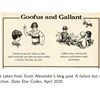bayesian

Bayesian and non-Bayesian epistemic attitudes and existential risk
In this talk Olle Häggström will sketch and contrast two different epistemic attitudes that roughly correspond to Bayesianism and Popperian falsificationism. He will argue that they both have virtues
R package bdynsys on Bayesian Dynamical Systems Modelling
Shyam Ranganathan, Viktoria Spaiser, Richard P. Mann, David J.T. Sumpter A collaborative work: http://cran.r-project.org/web/packages/bdynsys/index.html
POSTPONED! - New date November 25 - Olle Häggström: Bayesian and non-Bayesian epistemic attitudes (webinar)
THIS SEMINAR IS POSTPONED - New date November 25 Olle Häggströmis professor of mathematical statistics at Chalmers University of Technology, researcher at the Institute for Futures Studies and a board
Olle Häggström: Bayesian and non-Bayesian epistemic attitudes, with applications to the atomic bomb, artificial intelligence, covid-19 and existential risk (webinarium)
Olle Häggströmis professor of mathematical statistics at Chalmers University of Technology, researcher at the Institute for Futures Studies and a board member of the Royal Swedish Academy of Sciences
"Botten Ada" - Predicting the Swedish Election Using a Bayesian State-Space-Model
Research seminar with Jens Finnäs (J++), Måns Magnusson (Assistant Professor in statistics at Uppsala University), and Jonas Wallin (Associate Professor at Lund University). Register In the Swedish elect
Desire, Expectation, and Invariance
Mind, Volume 125, Issue 499, Pp. 691-725. Abstract The Desire-as-Belief thesis (DAB) states that any rational person desires a proposition exactly to the degree that she believes or expects the proposit

Explaining things with flow
This is a short presentation of what you can do with a software called Bayesian Dynamical Systems. It can be used to find patterns in large amounts of data and is the result of a cooperation between U
The Origins and Maintenance of Female Genital Modification across Africa
Bayesian Phylogenetic Modeling of Cultural Evolution under the Influence of Selection Human Nature, 27(2), 173-200. DOI 10.1007/s12110-015-9244-5 Abstract We present formal evolutionary models for the oristratification appear to play a more important role in the cross-cultural distribution of FGMo. To explain these cases, one must consider cultural evolutionary explanations in conjunction with behavioral ecological ones.We conclude with a discussion of the implications of our study for policies designed to end the practice of FGMo.
New method brings clarity to global economic and political change
Researchers at the Institute for Futures Studies and Uppsala University have developed a new method for studying complex social processes. The method makes it easy to discover dynamical patterns and re
Gambling with Death
Topoi, doi.org/10.1007/s11245-017-9519-z Abstract Orthodox expected utility theory imposes too stringent restrictions on what attitudes to risk one can rationally hold. Focusing on a life-and-death gambl








